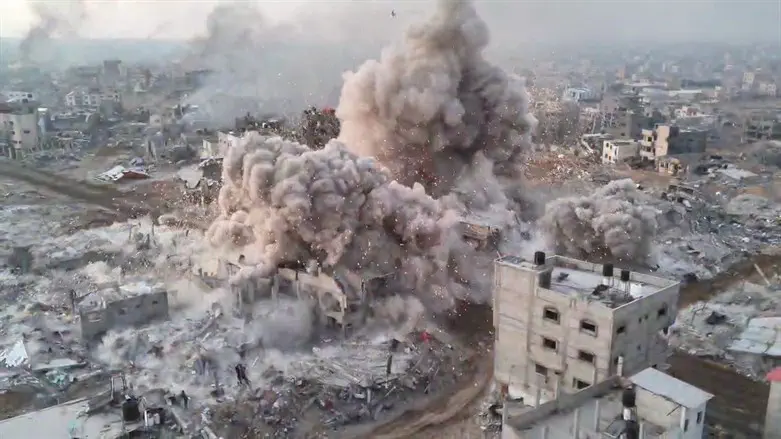
Davidi Ben Zion is an IDF Major in the 55th Paratrooper Reservist Brigade. He is also deputy head of the Shomron Regional Council.
Thousands of reserve soldiers like me came home this past Shabbat for the first time in four months. Once we had drunk a cup of good coffee and were brought up to date by our wives, those indomitable women of valor who managed households alone by day and spent nights sleepless with worry, people asked us, sometimes directly and sometimes by means of a look in the questioners’ eyes: “Have we won? Tell me, was it worth it? Did you meet your objectives? Did you advance towards our goals? Because what we hear on the media leaves us confused and uncertain.”
“We have not won,” says Amnon, a secular kibbutznik from the Jezreel Valley, “but we are winning.” Amnon, a former helicopter pilot, is a fair-minded man of integrity, but had I met him at the demonstations on Kaplan Street last year, both of us would not have believed that we would be sitting together a few months later aiming fire at enemy targets in the heart of the Gaza Strip.
“We are winning,” he says, “but this war cannot be given a short time frame that ends with a victory photo. This is a war that is ongoing and will continue for a long time, until its goals are achieved. The challenge of defeating a terrorist organization is completely different that that of defeating another state. And the hostages are a gamechanger that is close to all our hearts and cannot be ignored.”
We are winning because we have overcome the fears: of getting stuck in the Gaza swamp that limited our responses for so long, of the terror tunnels awaiting us there, and of the seeming impossibility of a ground offensive. We are winning because we defined clear goals and stages for the fighting. Every IDF fighter is aware of the two goals of the war: destroying Hamas and the return of the hostages. There are no new conceptions and no new platitudes.
The clearly defined stages are a wise, necessary step for winning the war in the long term. Military activity that is not well-planned can cause bitterness at the battle front as well as the home front, and defining the stages of the war along with the relevant targets allows for exact and efficient use of our resources.
The first victory is that the IDF overcame the initial shock, defined goals and is hell-bent on achieving them.
The second victory is the day-to-day advance on the ground. Each and every day, without stopping, we attack enemy neighborhoods in Khan Yunis. We find entrances to tunnels and destroy them, find weapons caches, and eliminate terrorists – and this for the past two months. When we finish our ground attacks, the wonderful engineering corps fighters blow up the houses that pose an operational danger to our forces’ positions. And then we go on. While we are carrying out our missions, other forces in other areas are acting strategically and moving forward to more accomplishments for the Jewish People’s welfare.
We will end this war with a clear victory, whether we achieve it by advancing linearly on a long road, as if it is a gigantic puzzle of which we have so far put together half, or whether it will be exponentially quick, by means of some sudden occurrence that decides the war. Either way, we will reach our goal and complete our mission.
The third victory, and the most important one of all, is our internal one. Smith is a company commander In or battalion. He is from Tel Aviv, runs a large and upscale mall in the city, and is an extremely bright person who has been doing reserve duty with us for 15 years, shoulder to shoulder. This week, over a cup of Turkish coffee in a Khan Yunis home, he told me succinctly: “Dudi, we have attained our victory, it is in the fact that we are here together.”
The year that preceded October 7th is hard to forget. Controversy is a legitimate tool in a democracy, and it is part and parcel of living together and reaching decisions; but the hostile discourse in the streets, the hatred on social media and the divisive atmosphere amng us – had no place in our country. Our enemies rubbed their hands in glee, certain that Israel would self-destruct any minute. Smith, whose first name happens to be a very Israeli Uri, said: “We have already won, because I am not counting our winning them, they are not a factor in the frame. Hamas doesn’t worry me when we are all here together; we left everything – career, family, businesses – and ran to save our brothers in the Gaza Envelope.”
We began this war in Kfar Aza and Kibbutz Be’eri, pushing back and eliminating the terrorist invaders, and from there we went for a six week alert up north to be sure that Nasrallah did not decide to enact a similar massacre in the Galilee. In December we went into Khan Yunis and stayed there for two months. We all stayed together, speaking with one voice. No one rose from his seat and said: Enough, I have had it, I am going home.
You ask if we won? My answer is: We have not yet won. But we are winning. And we will continue to win.
Translated from the Makor Rishon newspaper by Rochel Sylvetsky
